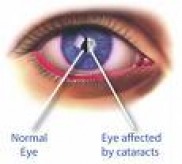Cataracts

You may have asked yourself, do I have cataracts? Perhaps you have been told by an eye doctor that you do have a cataract. You may also be wondering, what are cataracts and when will you need surgery for them? To understand the answers to these questions, you need to know a bit about the lens.
We are typically born with a clear lens due to the lamellar arrangement of the proteins that make up the lens. This allows the light passing through the lens to bend towards the part of the retina that is responsible for central vision (the macula). As we age, environmental and metabolic stresses cause these lamellar proteins to change their shape, which results in clouding of the lens. This change in shape causes light to bend away from the macula. It also causes the color of the lens to change from clear to yellow, brown, and even white in some cases. Patients often experience symptoms of cloudy vision, glare from oncoming headlights or on bright sunny days, difficulty reading or watching TV even with glasses, or double vision.
Many people will develop asymptomatic "aging changes to the lenses", which can be followed over time. The best way to find out if you have cataracts and whether or not you will need surgery is to visit your ophthalmologist to determine the state of your natural lens and your vision. Not all cataracts need to be surgically removed, some can simply be observed for progression.
If you and your ophthalmologist decide that you may benefit from cataract surgery, you should be aware of new innovations in technology that may minimize your need for glasses after cataract surgery. It is important to choose the proper lens implant and/or surgically correct astigmatism. There are options such as mono-focal implants, multi-focal implants, toric lens implants, and mono-vision. There are options that may help minimize your need for glasses for near vision, distance vision, or both. There are additional surgical techniques that can be employed to minimize astigmatism. Since every case is unique, your best option is to call for a personalized consultation to see what will get you seeing 20/20 again! Call (703) 263-3147 to set up your personalized consultation with Dr. Nisha Patel.
Information about Lens Options
Information about Laser Assisted Cataract Surgery
Testimonials
"REVIEW (20 Apr 2023):
Dr. Patel is truly outstanding! She and her staff are highly experienced, professional, compassionate, friendly, accessible, and responsive. Dr. Patel is absolutely the best in her field, to which I can attest honestly from years of superb diabetes eyecare, as well as recently and perfectly performed cataract surgeries. It’s AMAZING to have 20/15 vision in both eyes! Thank you Dr. Patel!" Mary Keast